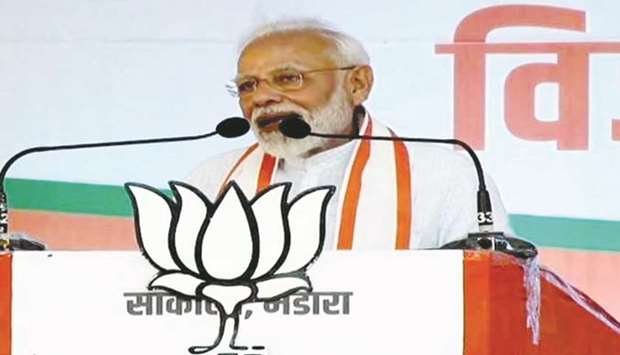Prime Minister Narendra Modi yesterday said it would take four months for Jammu and Kashmir to return to normal after his government stripped the state of its special status in August and imposed harsh restrictions.
At an election rally in Jalgoan, Modi said his government had taken necessary steps to maintain security in Jammu and Kashmir.
Alongside the scrapping of Article 370 of the constitution on August 5 that gave Jammu and Kashmir more autonomy than any other state, the government flooded the region with additional troops, and imposed curfew-like restrictions to keep a lid on protests.
Although many curbs, including those on movement have been eased, mobile telephone and Internet connections in the Kashmir Valley, home to around 7mn people, remain cut off.
Some mobile phone connections are set to be restored today, the government said on Saturday.
“I assure you that it won’t take more than four months to normalise the abnormal situation that has persisted there for 40 years,” Modi said at the rally.
“Jammu Kashmir and Ladakh aren’t just a piece of land for us,” Modi said, referring to the remote Buddhist enclave that borders China.
New Delhi insists that its move in August was essential to integrate Kashmir fully into India and bring development to the Himalayan region, but there is anger and discontent among many locals over the decision.
Despite the curbs, Kashmiris have come out on to the streets, and many shops and other commercial establishments in the valley have remained mostly shuttered in protests against the withdrawal of the special status.
Modi also challenged opposition parties to bring back the Article 370.
“From the holy land of Chhatrapati Shivaji Maharaj, I am challenging the opposition – make your stand clear and announce whether you support the government’s decision to scrap Article 370 or not,” Modi said, addressing his first election rally in Jalgaon.
He dared the opposition to include in their election manifestos for the October 21 Maharashtra polls a promise they would bring back Kashmir’s special status.
Taking a swipe at the opposition parties and their leaders for mouthing what he termed as ‘the same language as a neighbouring country’, he said “there seems to be a great co-ordination between them”.
Modi reiterated that on August 5 the government did something that nobody thought was possible.
Last week, the Jammu and Kashmir state government published full-page advertisements in local newspapers asking people to resume normal life, including reopening businesses and sending children to schools.
“Closed shops, no public transport?” the advertisements said, “Who benefits?”
Meanwhile, a joint delegation of the Jamaat-e-Islami Hind (JIH) and civil society has raised concerns over the prevailing situation in Kashmir and also the impact of communication clampdown on Kashmiris.
The team, which visited the valley from October 7 to 10, included S R Darapuri, former Uttar Pradesh Inspector General of Police; Malik Mohtashim Khan, JIH secretary; Shweta Verma, women & child rights activist, and Mujtaba Farooq, secretary general of the All India Muslim Majis Mushawarat.
The delegation visited Srinagar, Baramulla and Pulwama and met social activists, lawyers, representatives of NGOs and religious organisations.
“People are unable to contact loved ones even in emergencies. They find it difficult to call hospitals for medical emergencies,” the JIH said in a statement.

Prime Minister Narendra Modi addresses a public meeting in Bhandara, Maharashtra, yesterday.
